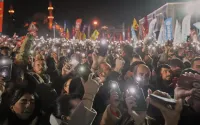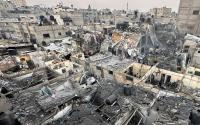13 September 2005Znet
United Nations Organization was founded by the people of this world to bring peace and welfare to themselves after having been viciously attacked by Nazism and Fascism. This huge assault resulted in some 60 million people being killed, an innumerable number left wounded and disabled, and it caused unlimited economical destruction worldwide. Now, after defeating the deadly force of fascism with such high costs, the United Nations is "celebrating" its 60th anniversary with the convening of what is called the biggest-ever summit of world leaders which was designed to tackle poverty and overhaul the UN. At least 175 of the world leaders have accepted the invitation for this "very special" September Summit, which has been in the planning for more than a year. In fact, there are only about 200 countries on earth and almost all of them will be represented at summit to be held in New York on September 14 to 16. George W. Bush, the leader of the USA which itself is the self-proclaimed leader of the world, has also confirmed his participation.)
The so-called biggest reform plan in the history of the organization is also to be reviewed and discussed at the summit after months', even many-years' work. The plan is reported to be consisting of some 39 pages. It might look small as such, but it comprises a few of the significant problems of humanity such as poverty, hunger, climate change, pandemics, universal education, etc. Now let us have a cursory look at some of these "minuscule" problems, with the aid of a few recent documents: Poverty and Hunger: According to a recent UN report, despite unprecedented economic growth in recent years, the rich have become richer and the poor even poorer, and the report also shows that women are facing more hardship than men in all walks of life... There is an unprecedented inequality between and within countries: 80 percent of the world's domestic product belongs to 1 billion people living in rich countries, whereas the remaining one fifth is shared by 5 billion people living in developing countries. Even richer countries like the USA, Canada and UK have failed to escape this inequality trend. 43 percent of the world's population, i.e, 2.8 billion people "lives" on an income of less than 2 USD per day. Poverty is a constant problem and only works in favour of the rich in industrialized countries. UN researchers warn that the growing schism between the "haves" and "have-nots" poses a major threat to democracies around the world, and will breed further violence and terror if the trend is not reversed (See, Haider Rizvi, "Globalization Driving Inequality, UN Warns," Inter Press Service, August 26, 2005) Climate Change: According to a recent scientific report, the current warming trends in the Arctic may shove the Arctic system into a seasonally ice-free state not seen for more than one million years. The melting is accelerating, and a team of researchers were surprised to see that they were unable to identify any natural processes that might slow the de-icing of the Arctic. The scientists did not see any natural mechanism that could stop the dramatic loss of ice. Such thawing could release additional greenhouse gases stored in the permafrost for thousands of years, which would amplify human-induced climate change. The head of the science committee of reporters said humans could step on the brakes by reducing carbon dioxide emissions. "The trouble is we don't really know where the threshold is beyond which these changes are inevitable and dangerous," Jonathan Overpeck said. "Therefore it is really important that we try hard, and as soon as we can, to dramatically reduce such emissions." (Sitnews.us, August 24, 2005)Another very recent scientific report shows that a vicious circle of CO2 emissions is speeding up climate change. The findings of the research show that the Kyoto treaty's attempts to curb man-made emissions of greenhouse gases are being undermined by extra carbon dioxide released naturally from the ground as a result of climate change. "All the consequences of global warming will occur more rapidly," said Guy Kirk of Cranfield University, who led the study. "That's the scary thing: the amount of time we have got to do something about it is smaller than we thought." (See Tim Radford, "Loss of Soil Carbon 'Will Speed Global Warming'," Guardian.co/UK, September 8, 2005) Diseases, women, children, and education: According to the by-now-famous -or infamous, depending on which side you are looking at it from- the UN Millennium Report, it is utterly essential that the issues of universal education, reducing poverty and hunger by half, reducing children mortality rates by two-thirds, substantially reducing gender inequalities which have reached terrible dimenisons, preventing the fearful spread of diseases like AIDS, tuberculosis and malaria must be dealt with until 2015 i.e, within a decade's time in order to avert catastrophe and social breakdown. And, to be able to accomplish these, it is deemed essential that rich countries should keep their promises to pay at least 0.7% of their gross domestic product towards aid to poor countries. (See, UN millennium project overview report 2005, http://www.unmillenniumproject.org reports/index_overview.htm).
Additionally, this year's UN Human Development Report takes stock of human development, including progress towards the Millennium Development Goals. "Looking beyond statistics, it highlights the human costs of missed targets and broken promises. Extreme inequality between countries and within countries is identified as one of the main barriers to human development-and as a powerful brake on accelerated progress towards the MDGs." (See, http://hdr.undp.org/reports/global/2005/ ) The document also constitutes "a stinging attack on US policies at home and abroad in a fightback against moves by Washington to undermine [the] UN 60th anniversary conference which will be the biggest gathering of world leaders in history." The report states that growth alone will not reduce poverty so long as the poor are denied full access to health, education and other social provision. […] The only way to eradicate poverty is to target inequalities. "Unless that is done the Millennium Development Goals will never be met." And, "tackling inequality [is] a message towards which [the new US Ambassador to UN] John Bolton and his fellow US neocons are deeply hostile." (See, Paul Vallely, "UN Hits Back at US in Report..." Independent.co/UK, September 8, 2005)
The big picture seems to be clear: three or four basic -if not so special- issues with rather basic suggestions for their solution are awaiting the world leaders at the UN special summit. US Ambassador John Bolton, who was rather "parachuted" to the UN Headquarters by President Bush who "by passed" the Senate during its summer recess, sounded a rather cheery and hopeful note about the possible outcome of the great summit. "Our hope is to have a strong consensus document for the high-level event," he said. (Edith M. Lederer, "Bolton: US Sets Sights on UN Reform," AP, August 26, 2005). It is reported that Bolton was seeking some 750 changes to the 36-page draft plan to be presented to the special summit. Mr. Bolton's list of "amendments" which runs 39 pages and is even longer than the original draft-plan to save humanity, it is reported, "if successful, would leave the plan in tatters." (See, Ewan McAskill, "Britain Heads for Clash with US," Guardian, co/UK, August 27, 2005).
Some 750 "amendments"! However, just to placate those who could be horrified with the sheer magnanimity of this number it should be underlined that Mr. Bolton, in fact, wants very few issues to be dropped off humanity's agenda, namely, eliminating all references to: 1) Cutting extreme poverty by half in ten years' time; 2) a call for further action against climate change and global warming (the US Ambassador is actually and officially calling for the deletion of "respect for nature"!); 3) ensuring universal primary education; 4) stemming the AIDS pandemic and other deadly diseases; and 5) a call for rich nations to increase development assistance. (see Lederer, loc.cit.)
So, you see: With just five light -but deft- touches of the right hand index finger to the "delete" button and presto: Now you see it, now you don't!
On the other hand, the US wants a few minor issues to be added to the plan, such as: 1) Abolishing the "discredited" (?) UN Human Rights Commission and establishing instead a Human Rights Council -surely under the leadership of the US; 2) Making extensive management reforms that "would take power away from U.N. member states to oversee the world body" (ibid); and, 3) more "action" against terrorism - with neither an attempt to define either action or terrorism, nor a word to address the root causes of terrorism... (ibid)… So, once again, with just three taps of the very same index finger - except, pushing the "insert" button this time - you have it: Out with terror, in with human rights, and in with a thoroughly reformed brand new world organization having a "lame duck secretary general after the US-lead Volcker report on the oil-for-food scandal. (See, Vallely, loc.cit.) "Time is short," said the US Ambassador with the bushy mustache, stressing the need for flexibility to "maximize our chances of success." (AP, loc.cit.) Clear and fortright enough.
Actually, as the American thinker Noam Chomsky stated, "John Bolton has always been clear and fortright in expressing his attitude toward the UN: 'There is no UN,' he said. 'When the US leads, the UN will follow. When it suits our interests to do so, we will do so. When it does not suit our interests we will not.' That position is at the extreme of a rather narrow elite consensus, which is opposed by the overwhelming majority of the public who strongly supports the UN." (Noam Chomsky, "What We Know on The Universals Of Language And Rights", Boston Review; July 5, 2005) In addition, numerous public opinion polls invariably show that not only the American public but an overwhelming majority of the world's people support the UN and its basic reform plan. So, what we have here on our hands is probably the greatest schism on earth, or what you might call the "global schizophrenia syndrome" - The ruling authorithy of the USA on the one hand, and the rest of the world, on the other.
Now, here is a little prophecy: The US will never be in peace without completely destroying the biggest reform plan in the history of the UN, without killing it officially at its biggest summit ever. However, the critical question is whether the rest of the world is going to allow the USA to have this peace of mind or not. Will the good peoples on this good earth be able to stand against this molestation by a very narrow and very lethal elite? Will they finally have the moral courage to defend themselves? Will they be able to save this modest plan from being sent to the shredders? The good news is that here may be a chance, however slim! The small but significant victory gained to save the very modest Kyoto Protocol on climate change from the molesting hands of the US back in 2001 could serve as an example to the peoples and the leaders of the rest of the world.
In his dramatic and funny book, High Tide - News From a Warming World (Flamingo, 2004), the British reporter Mark Lynas describes the reigning atmosphere in the beginning of Conference in Bonn in 2001 in no optimistic terms:
"It was difficult to believe that things could get much worse. US obstructionism had almost sunk the Kyoto Protocol […] Once George Bush arrived in office, things degenerated even more rapidly. Clinton had at least negotiated, but Bush - with the arrogance that quickly came to characterize his presidency - went much further […] For a while it seemed as if the world might unite against America, but by the Bonn Conference, a different kind of politics was in play. […] The shadowy presence of the world's most powerful nation still loomed over the entire proceedings. And rumours immediately began to fly about back-room pressure being leveraged by the US delegation, despite its promise by its leader Paula Dobriansky […] that the US would stay out of Kyoto-related discussions. The sour-looking Dobriansky didn't help her case by making a hypocritical speech at the first plenary." (pp. 273-282).
Yet, after several hectic days, when the time finally came to the last plenary session the US had surprisingly lost that round. In Lynas's words, "the fight to stop major climate destabilization ha[d] only just begun, but the battle lines ha[d] already been drawn." (p.285). Now, after four years the necessary common sense and the will power to win another small -but nevertheless major- victory in this "battle" should once more be apparent to all: The peoples of the world can start waging the long, protracted battle to save the UN and themselves as well.
Admittedly, it is a precarious situation at best! But, it is also true that whenever the peoples of the world have managed to show the least bit of will power in getting their acts together, things turned the other way with surprising "ease"... In fact, Bushy Bolton's worries may be partly originating from just such a premonition. It may well be that he is afraid of "time's winged chariot", and that perhaps he is scared stiff that his time is up already before he will ever have the chance to forge that bizarre "consensus" on US hegemony over the rest of humanity...
One certainly cannot predict how things will "work out" at the special summit. But, whatever the outcome, one can safely conjure the following scenario: The world will be watching the marathon of a minimum of 14 hours of speeches, with each leader (the ones allowed a visa by the US, that is) allocated five minutes at the podium. At the final of the marathon, Mr George W. Bush steps up the podium - among sporadic applause -as the last speaker (of the "host" nation to the UN), but clearly as the winner of the race as well. This man who totally denies every earthly fact related to hunger, poverty, equality, global warming, diseases, the plight of women, children, aid, justice, rule of law, empathy, co-operation, and everything that is humane, this iron-willed man who strives to erase all these facts from the memories of the UN delegates and ours too, begins his 5-minute speech -without a hint of irony- in this manner: "The United States came to this great global summit to work constructively to enhance international co-operation on a very important challenge against humanity. The US takes these problems and noble goals in front of us really seriously. I should mention with pride that the US government is determined and committed to play the leading role in the world against this great challenge until the end. At the same time, the United States must emphasize that the adoption of the proposals for cutting poverty by 2015, for making a renewed call to curb climate change, for US and other industrial nations paying 0.7 percent of their gross domestic product towards aid, for imposing curbs on the arms trade … is not sound policy, and this policy is not workable for the United States…" Now, if I'm allowed, "I have a dream" too. And, this is the exact point in time where my humble dream begins… Ladies and gentlemen, it goes like this: The leader of the strongest nation on earth gives a short pause to take a sweeping glance at the 175 odd leaders and hundreds of members of delegations who give a slight collective gasp upon his very last words in the grand luxurious hall of the UN General Assembly. He continues: "The US government takes these issues very seriously…"
And then pandemonium breaks. A great many -if not all- of those world leaders who have been listening somewhat impatiently right up to that moment suddenly rise from their seats! And these are not necessarily the ones who are among oil exporter countries like Venezuela. For instance, we can see the leaders and delegates of poor Guinea, a country with the 150th GDP in the world who, as a non-permanent member of the UN Security Council, had shown remarkable moral courage back in 2003 just days before the invasion of Iraq not to take a position on the use of military force to disarm Iraq. And that despite strong pressure and threats by the US to attempt to coerce nations on the Security Council to support them to the extent that US telling them that "any country that doesn't go along with us will be paying a very heavy price."(http://en.wikipedia.org/wiki/ The_UN Security_Council_and_the_Iraq_war). Not only the Guineans, too. .. As if on a cue all the others also rise! So, great or small, all delegations of the countries in the Great Hall suddenly and show the audacity to INTERRUPT the leader! They are joined by the observers, journalists and even some of the the security guards join the uproar... Everybody greets this unbelievable monument of hypocrisy with an equally unbelievable cacophonic symphony of boos and jeers and hollers and whistles and catcalls and yodels and whatnot…
And, to complement this personal dream - which itself has been heavily inspired by the very real observations of Mark Lynas's nightmarish time-travel - again with his apt description of reality:
"Something … snap[s], and all the world's injured pride and fury unite[s] everyone in the single objective of calling Bush's bluff." (op.cit, p. 285)
Dreams, eh? Mmm. we'll see.
* Omer Madra is a broadcast journalist in Turkey and host of the Acik Radyo (Open Radio) program Open Newspaper. Madra also teaches international relations at the Istanbul Bilgi University. (English translation by Esra Birkan)






